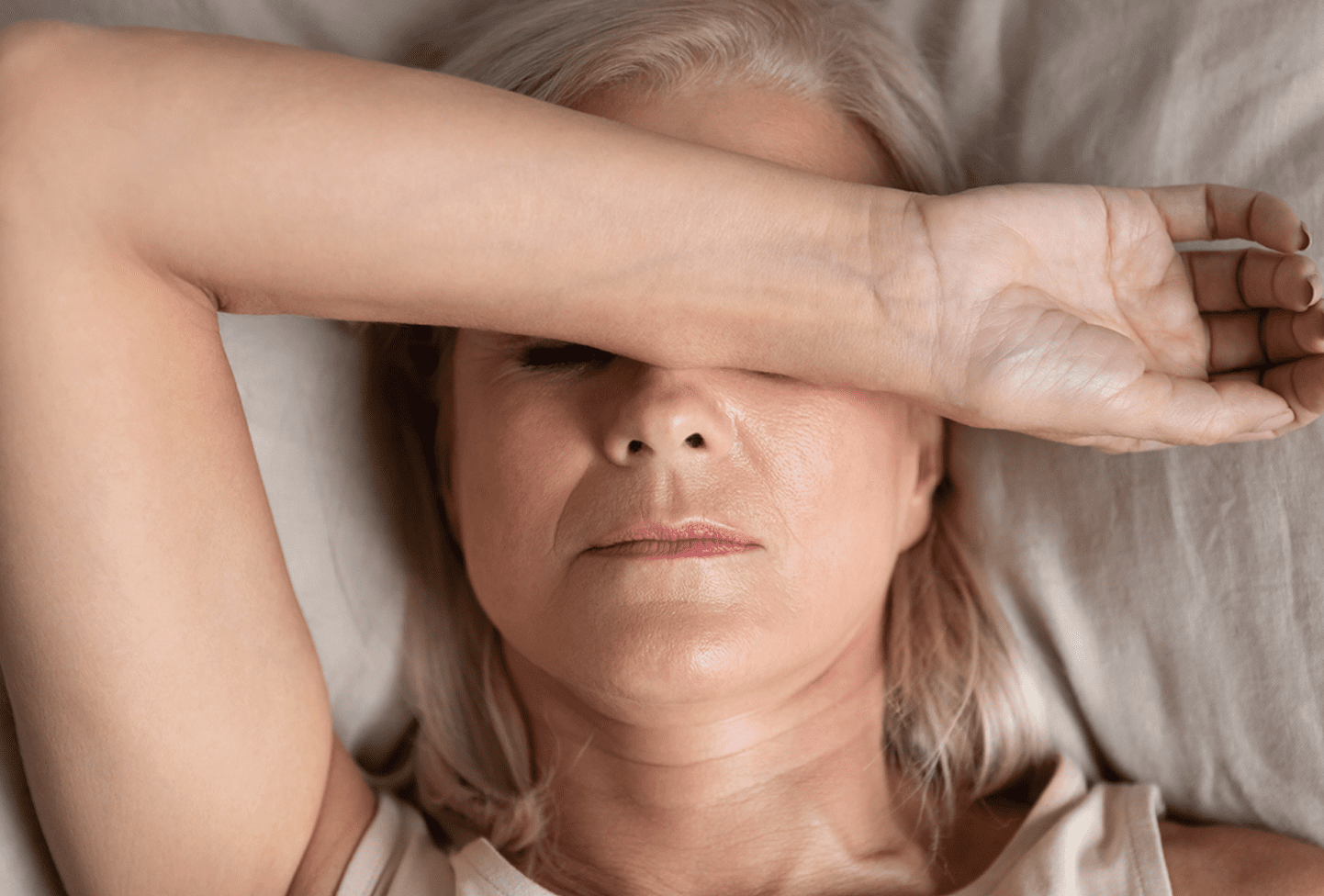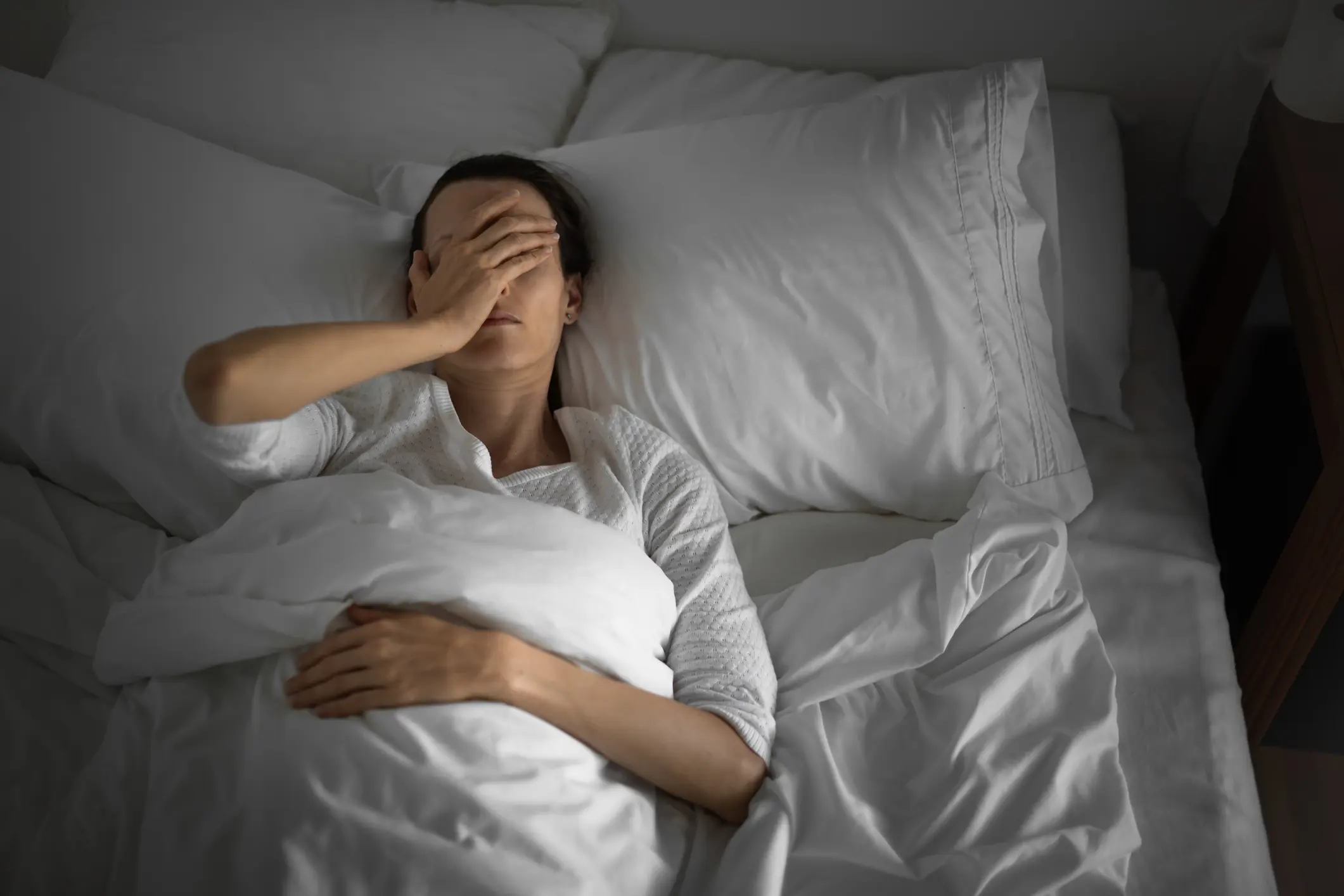
Published on Sep 24, 2024
Last modified on Apr 11, 2025
Is Menopausal Anxiety Responsible for My Insomnia?
7 min read
Clinically reviewed by Grow Therapy Head of Clinical Excellence, Cynthia Grant, PhD, LCSW, MBA, and Elektra Health Chief Medical Officer, Nora Lansen, MA, MD, MSCP.
Anxiety and insomnia are some of the most common symptoms of menopause, and both can be disruptive on their own. However, with one often comes the other, which for women struggling with other menopause symptoms can feel particularly troublesome. The good news? There’s plenty we can do to address each of these symptoms, including lifestyle changes and a range of treatment options. Let’s take a look at the causes of anxiety and insomnia, their relationship to each other, and what can be done to ease them.
Anxiety and menopause
Let’s just first establish that as we approach perimenopause and menopause, we’re juggling a lot of potential stressors! We may be caring for kids or aging parents, busy at work in peak career years, or all of the above. So it’s natural that we’d have a lot on our plates and feel overwhelmed sometimes (or even most of the time). But it’s important to recognize that there are physiological factors at play here as well, such as, *cough cough,* hormonal changes.
During perimenopause, estrogen, which typically helps increase levels of serotonin, the so-called happy hormone, is in decline. As estrogen levels drop, serotonin processing is impacted, which can result in anxiety and other mood changes. Symptoms of anxiety can be mental and physical, including:
- Tension and nervousness
- Ongoing worry or feelings of dread
- Panic
- Upset stomach
- Headaches
- Increased heart rate
- And, of course, sleep difficulties (…more on this in a bit)
Some women may also experience panic attacks — episodes of extreme anxiety that inhibit clear thinking. Panic attacks can elicit intense physical symptoms like heart palpitations, shortness of breath, and chest pain. Additionally, women who experience anxiety are 3-5x more likely to have vasomotor symptoms (the science-y term for hot flashes and night sweats).
Anxiety across stages of menopause
In perimenopause: For women in early perimenopause, mood fluctuations and feelings of anxiety are typically concentrated in the premenstrual period (PMS) — right before we get our period.
Late perimenopause/early postmenopause: During late perimenopause and early postmenopause, mood symptoms can manifest as more prominent feelings of general anxiety — as opposed to short, acute bouts.
We also know that the risk of menopause-related depression and anxiety is higher for those with a history of premenstrual dysphoric disorder (PMDD), a more serious form of PMS affecting 5-7% of menstruating women.
Okay, but what does this have to do with insomnia? Well, a lot…
Insomnia and menopause
Before we dive into the science of insomnia, let’s get our definitions straight: insomnia is a sleep disorder that makes falling and staying asleep difficult. We may experience acute (aka short-term) or chronic insomnia, the latter of which refers to cases where we experience insomnia three or more times per week, for three or more months.
During menopause, there are several forces that can create the perfect storm for this condition:
- Circadian rhythm interruption: As we age, our circadian rhythm shifts, which can cause unpredictable sleep-wake cycles. In other words, our internal clocks are interrupted, which can make falling and staying asleep more difficult.
- Increased cortisol: Around the menopausal transition, we are also experiencing an increase in cortisol — a stress hormone correlated with poor quality sleep.
And of course, if we’re also experiencing anxiety and consequent rumination or negative thoughts, falling asleep is going to be even harder…
The anxiety/insomnia connection
So, anxiety can affect sleep and contribute to insomnia by keeping us up, wheels-a-spinning about something we said at work that day — or awakening multiple times throughout the night — but poor sleep quality can also keep us anxious. In addition to causing daytime sleepiness, fatigue, and brain fog the next day, sleep deprivation can make us irritable and even more anxious. This can quickly turn into a vicious cycle: we’re anxious because of hormonal changes → we have trouble sleeping → lack of sleep makes us anxious…and around and around. Obviously, not great for quality of life or general well-being. Buuut, now that we’ve talked at length about the consequences of anxiety and insomnia and their maddening vicious cycle, let’s talk about what is in our control.
Where to Start…
For women experiencing either anxiety or insomnia, it’s important to make sure your blood work is recent. A routine physical and lab work can help identify medical issues correlated with anxiety and insomnia, including the hormone fluctuations associated with menopause. Elektra’s board-certified menopause clinicians work with patients to develop a personalized care plan, including labs and prescriptions as needed.
What you can do about anxiety…
Move your body regularly
Scientists have found that regular movement decreases overall levels of tension, elevates and stabilizes your mood, improves sleep, and boosts self-esteem. Not too shabby, right?
Find a Great Therapist
There are many evidence-based treatments a therapist can provide to help manage menopause-related anxiety. One popular method is cognitive behavioral therapy (CBT), which teaches recognition of and adjustments to unhelpful thought patterns brought on by anxiety or depression. CBT is often used in conjunction with mindfulness practices involving breathing techniques, meditations and body awareness. If you are interested in trying therapy to manage mental health symptoms, Grow Therapy offers online and in-person appointments and is covered by many insurers including Medicaid and Medicare. You can tailor search to find a therapist specializing in anxiety, women’s issues, CBT and mindfulness, alongside many other options for customization. It is encouraging to know that the majority of people who receive treatment for moderate-to-severe anxiety from Grow Therapy achieve a clinically significant improvement in symptoms.
Know That Medications Can Help
You may be familiar with the class of antidepressants known as selective serotonin reuptake inhibitors (SSRIs). These medications increase the levels of serotonin in the brain (remember – the happy hormone), which can improve symptoms of both anxiety and depression. SSRIs are one of multiple options, and Grow Therapy has providers available to speak with you about medication that may help improve anxiety.
What you can do about insomnia…
Limit caffeine close to bedtime
No one wants to hear this, but we have to say it. Caffeine is a stimulant and stays in our body for about 10-12 hours after consumption, albeit in smaller quantities as time goes on. As a general rule of thumb, try to avoid it after 2pm.
Create a wind-down routine
Create a bedtime routine that involves practices that help you relax. Doing so will lower sympathetic activation (your body’s fight or flight system…which is not helpful for good sleep!).This might look like a regular bath, cup of tea, yoga sequence, or any other activity that calms you.
Stick to a regular sleep schedule
For women experiencing sleep disturbances, going to bed and waking up at roughly the same time every day can be helpful, due to our circadian rhythm (aka our internal clock), which typically synchronizes with light and dark, so that we are essentially most alert during the day and least alert at night.
Keep a cool sleep environment
Right around bedtime, our body temperature drops 1-2 degrees, which signals to our internal clock that it’s time to hit the hay. We recommend keeping your bedroom at a cool 60 – 67°F. If that’s not enough, you can even try bamboo cooling sheets.
Over-the-counter sleep aids
There are several over-the-counter sleep aids that may help you get better sleep, including melatonin, magnesium, valerian root, lemon balm, and maca. While these aids are not intended for long-term use, they can be helpful as a short-term solution for insomnia. (A quick note on supplements: The FDA does not verify that supplements contain what they say they do or whether they’re contaminated with harmful ingredients, but there are several independent organizations that offer quality testing and seals of approval that we can look for as an indication of responsible manufacturing. Three of the most well-known organizations include: NSF International, U.S. Pharmacopeia (USP), and UL.)
Give CBT-I a try
CBT-I, or cognitive behavioral therapy for insomnia, is a treatment modality that focuses on restructuring the thoughts and behaviors that contribute to insomnia. The treatment typically involves a set program with six to eight sessions, and can be used in conjunction with pharmaceuticals or over-the-counter sleep aids. Now, before you roll your eyes, we totally recognize that this type of treatment involves a commitment of time – but evidence of its efficacy is strong, and it can be helpful for a patient’s entire lifetime.
Can menopausal hormone therapy (MHT) help?
While MHT (previously known as hormone replacement therapy or HRT) is not currently recognized as a first-line treatment for insomnia or anxiety, oral progesterone may improve sleep quality for women who take it. That said, more research is needed to fully understand the relationship between MHT and these symptoms.
When to see a doctor
Insomnia, in particular, can snowball quickly — and when left untreated, a handful of poor nights’ sleep can become the norm. For women struggling with insomnia and/or anxiety, it’s never too soon to see a doctor.
What type of healthcare provider should I see?
Given the inextricable relationship between insomnia and anxiety, if you are experiencing both, there really isn’t a bad place to start when it comes to treatment. If you begin by addressing one of the conditions, it will likely benefit the other. Some of us may require a multi-modal approach, but treatment for each is doubly beneficial. Starting with a therapist can be a great option, and a physician or nurse practitioner can also help to address these conditions.
READ MORE:



